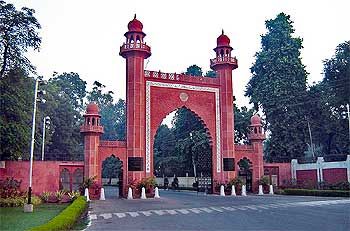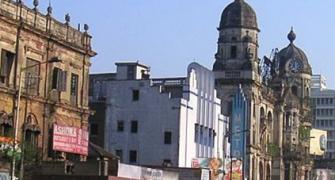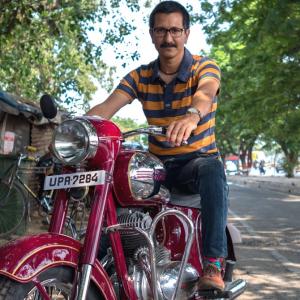
'The BJP politics of appropriating icons from its ideological adversaries could only be a desperate attempt to extend the Jat-Muslim divide in Uttar Pradesh. Why this desperation when it can comfortably get votes on the plank of economic development,' asks Mohammad Sajjad.
Why does the Bharatiya Janata Party's Uttar Pradesh unit try to pursue the politics of communal polarisation through an educational institution?
Why does it want to appropriate a freedom fighter, like Raja Mahendra Pratap Singh (1886 to 1979), who has more to do with Marxism and contacts with Lenin?
We are living in times when majoritarian reactionary tendencies are on the menacing rise. This fright is all pervasive across our subcontinent, to be more specific, in Pakistan and in Bangladesh.
In Pakistan, the fascism of the crudest possible violence and physical elimination in the name of blasphemy, not to say of forced conversions of its religious minorities, has become deeply disturbing.
Even more disturbing is the fact that these non-State actors seem to be getting support from unexpected quarters of the intelligentsia like advocates and clerics. The violent upsurges in the name of religion seem to becoming the most pressing problem of our times.
In Bastar, Chhattisgarh, there are reports that some hot-headed majoritarian reactionary groups are coercing Christian missionary schools to abandon the usage of terms like 'sister,' 'father,' 'principal.' They are forcing them to use Sanskrit synonyms of such terms.
The recent onslaught on the Aligarh Muslim University should be seen in this larger context.
First of all, the basic facts pertaining to the controversy.
Raja Mahendra Pratap Singh's 128th birthday is on December 1. Suddenly, local BJP leaders want the AMU to celebrate his birthday, declare that day a holiday for the AMU and want a hostel at the AMU to be named after him. The reason the BJP leaders put forward is that the land for the AMU was donated by the Raja, hence he should be honoured accordingly.
Firstly, this assertion is patently wrong. Among so many donors -- Hindus, Muslims, Christians, Sikhs, etc -- is one Raja Ghanshyam Singh of the Mursan estate (Aligarh; now in Hathras district, and one of the biggest zamindars of UP and, Raja Mahendra Pratap Singh's father).
Being a good friend of AMU founder Sir Syed Ahmad Khan (1817-98), Raja Ghanshyam Singh contributed Rs 250 with which a room in a hostel was constructed. That is presently room number 31 of the Sir Syed Hall (South), towards the east of the Victoria Gate.
The gate of each room of the residential hall carries stone inscriptions acknowledging the contributions of donors. In most of the cases people having contributed less than Rs 500 have not been acknowledged in this way, but stone inscriptions are pasted on the rooms of the hostel.
Among the cash donors, the highest contribution in 1875-1876 came from Adamjee Peerbhai who had given Rs 110,000. This is also acknowledged by the stone inscription.
However, the land which the BJP claims have been donated by the zamindar of Mursan is presently being used as a playground of the City High School across the G T Road in the old city of Aligarh, around four kilometres away from AMU's main campus.
And this triangle shaped land (1.22 acres) was given to the AMU on a lease for 90 years in 1929. Thus, in 2019, the proprietorship of the land will go back to Raja Mahendra Pratap Singh's descendents who receive the lease amount from the AMU every year.
Ironically, this particular plot of land was also claimed by Krishna Kumar Navaman, a four time BJP MLA from Aligarh. In 1984, the matter went to the district court and it travelled up to the Supreme Court where in 2003 an interim order was passed that before the expiry of the lease no other claimant can occupy the land.
Another irony is Raja Mahendra Pratap was elected as an Independent candidate to the Lok Sabha in 1957 from Mathura wherein Atal Bihari Vajpayee lost his security deposit. Again in 1967, the Raj contested the Lok Sabha election from Aligarh where his central plank was to oppose the Jana Sangh, the BJP's political parent.
On Sir Syed's insistence, Raja Ghanshyam Singh admitted his third son Raja Mahendra Pratap Singh to the school maintained by the Mohammedan Anglo-Oriental College College (later, the AMU) in 1895-1896 where he studied until 1907 without completing his graduation. By this time the college students had become too restive against British rule in India.
By the second decade of the 20th century, Raja Mahendra Pratap jumped into the freedom struggle. In this great adventure he joined the Silk Letter Conspiracy (Reshmi Roomaal Tehreek) of the Deoband Ulema and they formed the first provisional government of India in exile in Kabul (1915). His close associates were Maulana Obaidullah Sindhi, Barkatullah Bhopali (1854 to 1927), Mahmudul Hasan, among many others.
All these details are recorded by him in his autobiography, My Life Story, volume I, (published in 1947 and reprinted in 2004) wherein Raja Mahendra Pratap also gives meticulous details of how Sir Syed took care of him with fatherly affections. This part of his autobiographical narrative is most touching and emotional.
The previous incarnations of the Sangh Parivar were nowhere to be seen in this patriotic anti-imperialism venture. The AMU community spread across the globe is too proud of its worthy alumni like Mahendra Pratap and of so many others. In 1977 when it celebrated its centenary foundation day, the chief guest of the huge commemorative event was Raja Mahendra Pratap.
The AMU does not celebrate birth anniversaries of the biggest donors nor of alumni having been the tallest of freedom fighters, like Hasrat Mohani (1875 to 1951), the Ali Brothers, Syed Mahmud (1889 to 1971), and scores of others. It celebrates the birth anniversary of only its founder.
If it declares holidays on the birth anniversaries of each of its donors, it will hardly be left with any working day. This would be true of many other educational institutions.
Moreover, even if he would have been a substantial donor, would you force an institution to shut down for a day? As Nadim Asrar, a former president of the AMU students union says, 'There is something called grace in donation, and in the (resounding electoral) victory (of the BJP) too.'
The BJP politics of appropriating icons from its ideological adversaries could only be a desperate attempt to extend the bloody Jat-Muslim divide beyond Muzaffarnagar in Uttar Pradesh. The question is: Why this desperation when it can comfortably get votes on the plank of economic development and on other meaningful agendas?
Why should a political party intrude into a university and encroach upon its autonomy dictating who should be commemorated by the university?
If at all, the BJP is so sincere about honouring and commemorating freedom fighters like Raja Mahendra Pratap, then why doesn't the BJP ask for installation of his statue in the Central Hall of Parliament?
Be that as it may, just to defuse the crisis and for the sake of letting peace prevail in communally-sensitive Aligarh, the AMU announced that rather than succumb to the politically motivated demand, it would organise a seminar on the contributions of its alumni to India's freedom struggle.
With this, the imbroglio may have been averted, but the larger question of the sanctity and autonomy of universities remain under threat.
Mohammad Sajjad teaches history at AMU and has published two books.










